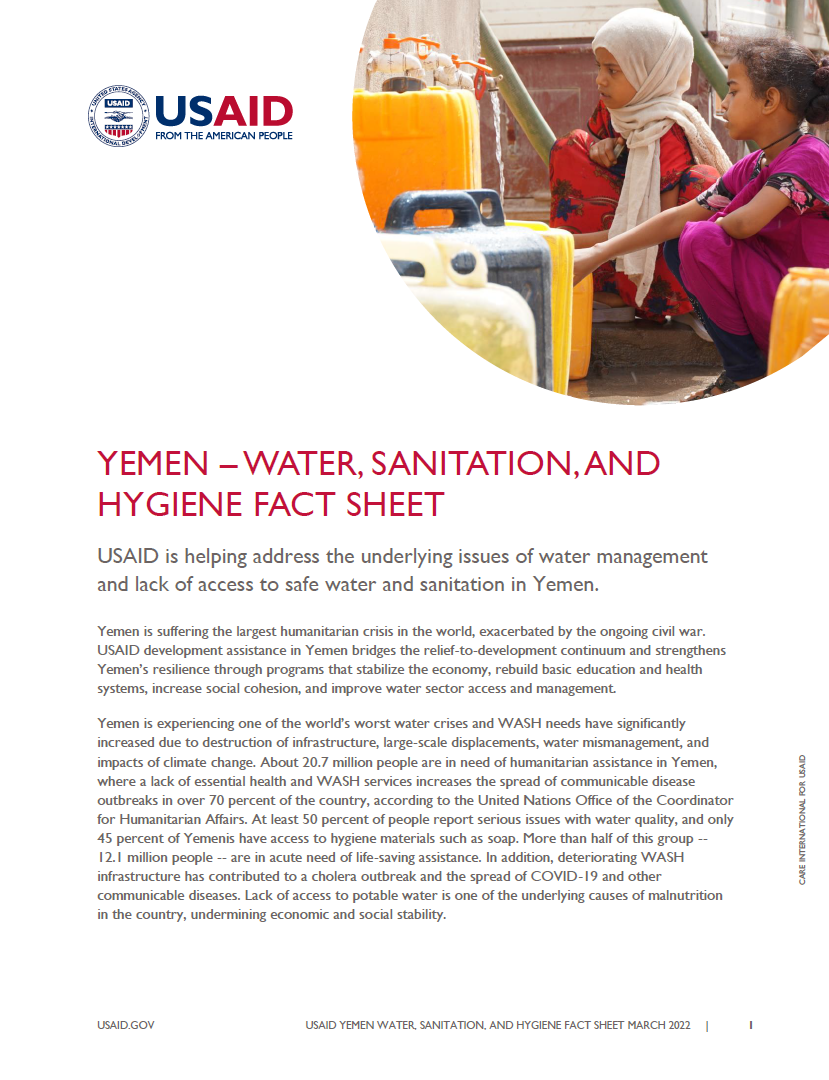Speeches Shim
USAID is helping address the underlying issues of water management and lack of access to safe water and sanitation in Yemen.
USAID development assistance in Yemen bridges the relief-to-development continuum and strengthens Yemen’s resilience through programs that stabilize the economy, rebuild basic education and health systems, increase social cohesion, and improve water sector access and management.
Yemen is experiencing one of the world’s worst water crises and WASH needs have significantly increased due to destruction of infrastructure, large-scale displacements, water mismanagement, and impacts of climate change. About 20.7 million people are in need of humanitarian assistance in Yemen, where a lack of essential health and WASH services increases the spread of communicable disease outbreaks in over 70 percent of the country, according to the United Nations Office of the Coordinator for Humanitarian Affairs. At least 50 percent of people report serious issues with water quality, and only 45 percent of Yemenis have access to hygiene materials such as soap. More than half of this group -- 12.1 million people -- are in acute need of life-saving assistance. In addition, deteriorating WASH infrastructure has contributed to a cholera outbreak and the spread of COVID-19 and other communicable diseases. Lack of access to potable water is one of the underlying causes of malnutrition in the country, undermining economic and social stability.
USAID's Response and Results
USAID Yemen Water, Sanitation and Hygiene Fact Sheet ![]() (pdf - 316k)
(pdf - 316k)
USAID works to instill basic water management as well as water and sanitation assistance to vulnerable populations, including those affected by the conflict. USAID programs address the underlying issues of limited access to safe water and sanitation, including limited water governance, in both rural and urban areas. The Addressing WASH Services in Yemen project rehabilitates and constructs water and sanitation infrastructure; strengthens the capacity of institutions and service providers to sustainably operate and manage WASH services and facilities; and increases resilience of community members to WASH-related illnesses through hygiene promotion.
In Fiscal Year 2021, USAID assisted more than 1.5 million vulnerable Yemenis with increased, sustainable access to clean water, improved sanitation services, and hygiene awareness sessions to prevent the spread of communicable diseases such as cholera and COVID-19. USAID assistance included:
- Increased access to water for 565,625 beneficiaries through rehabilitation of water systems.
- Improved sanitation services for 442,798 people through repaired sewage networks, installation of toilets and handwashing facilities at health facilities, and construction of household latrines.
- Hygiene assistance for 129,994 people through awareness campaigns focused on handwashing and safe water handling; distribution of household hygiene kits containing soap, laundry detergent, chlorine tablets, and other supplies; and personal protective equipment for health facilities.
- Increased access to clean water and sanitation facilities in schools for 377,606 children through installation of new latrines and water tanks.
USAID’s WASH programming supports U.S. Government priorities as outlined in the U.S. Global Water Strategy. The Strategy, first required by the Water for the World Act of 2014, articulates the whole-of-Government framework for the United States to advance global leadership on challenges related to water and sanitation ensuring people have sustainable, sufficient, and clean supplies of water to be healthy, prosperous, and resilient. USAID’s Water and Development Plan complements this Strategy through efforts focused on sustainable access to water and sanitation services and adoption of key hygiene behaviors; sound management and protection of freshwater resources; and strengthened water sector governance, financing, and institutions.
Last updated: April 25, 2022


Comment
Make a general inquiry or suggest an improvement.